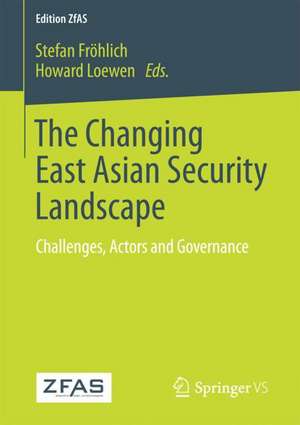The Changing East Asian Security Landscape: Challenges, Actors and Governance: Edition ZfAS
Editat de Stefan Fröhlich, Howard Loewenen Limba Engleză Paperback – 5 dec 2017
Preț: 346.27 lei
Nou
Puncte Express: 519
Preț estimativ în valută:
66.26€ • 72.20$ • 55.83£
66.26€ • 72.20$ • 55.83£
Carte tipărită la comandă
Livrare economică 23 aprilie-07 mai
Preluare comenzi: 021 569.72.76
Specificații
ISBN-13: 9783658188931
ISBN-10: 3658188936
Pagini: 161
Ilustrații: VI, 163 p.
Dimensiuni: 148 x 210 mm
Greutate: 0.21 kg
Ediția:1st ed. 2018
Editura: Springer Fachmedien Wiesbaden
Colecția Springer VS
Seria Edition ZfAS
Locul publicării:Wiesbaden, Germany
ISBN-10: 3658188936
Pagini: 161
Ilustrații: VI, 163 p.
Dimensiuni: 148 x 210 mm
Greutate: 0.21 kg
Ediția:1st ed. 2018
Editura: Springer Fachmedien Wiesbaden
Colecția Springer VS
Seria Edition ZfAS
Locul publicării:Wiesbaden, Germany
Cuprins
- The US pivot and its implications for the current East Asian Security Architecture
- Intra-Asian Defense Cooperation and the Emergence of a 2nd Order Security Architecture in the Asia-Pacific
- Sino-American Competition as Security Suppliers in the Asia-Pacific
- Paul Kennedy’s Conception of Great Power Rivalry and US-China Relations in the Obama Era etc.
Notă biografică
Dr. Stefan Fröhlich is Professor for International Politics at Friedrich-Alexander University Erlangen-Nürnberg, Germany.
Dr. Howard Loewen is Visiting Professor of Political Science at Friedrich-Alexander University Erlangen-Nürnberg, Germany.
Dr. Howard Loewen is Visiting Professor of Political Science at Friedrich-Alexander University Erlangen-Nürnberg, Germany.
Textul de pe ultima copertă
This book examines a highly relevant empirical issue in International Rela- tions. A group of renowned scholars analyzes the new dynamics of East Asian Security and its respective governance structure challenging the conventional wisdom that the US as the traditional offshore balancer in the region is still the most definitive element in determining the outcomes in the region. Since the US pivot and other actors’ responses to it the security landscape has changed in form, size and function. In order to analyze and explain these changes, the authors apply hypotheses derived from Inter- national Relations middle range theories (i.e. soft and hard balancing) to cases of bilateral and multilateral security governance in East Asia.
Contents
•The US pivot and its implications for the current East Asian Security Architecture •Intra-Asian Defense Cooperation and the Emergence of a 2nd Order Security Architecture in the Asia-Pacific •Sino-American Competitionas Security Suppliers in the Asia-Pacific •Paul Kennedy’s Conception of Great Power Rivalry and US-China Relations in the Obama Era etc.
Target Groups
Lecturers and students of international politics
The Editors
Dr. Stefan Fröhlich is Professor for International Politics at Friedrich-Alexan-der University Erlangen-Nürnberg, Germany.
Dr. Howard Loewen is Visiting Professor of Political Science at Friedrich-Alexander University Erlangen-Nürnberg, Germany.
Caracteristici
Dynamics of the current bilateral and multilateral security architecture in East Asia with a special focus on external actors China´s rise as a geopolitical challenge with regional implication for East Asia US-Pivot/Rebalancing and its implications for the East Asian Security Architecture Includes supplementary material: sn.pub/extras





